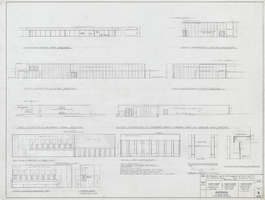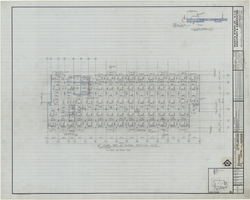Search the Special Collections and Archives Portal
Search Results
Esther Lynn oral history interview
Identifier
Abstract
Oral history interview with Esther Lynn conducted by Dennis McBride on August 24, 2000 for the Las Vegas Gay, Lesbian, Bisexual and Transgender Archives Oral History Project. Lynn moved to Las Vegas, Nevada from Los Angeles, California in 1976. She is a writer and editor, focusing on the Las Vegas entertainment scene, with by-lines in many local and national publications.
Archival Collection
Lincy Institute "Perspectives from the COVID-19 Pandemic" Oral History Project
Identifier
Abstract
The Lincy Institute "Perspectives from the COVID-19 Pandemic" Oral History Project contains transcribed interviews with Nevada leaders, interviewed for their perspective and experiences leading during and after the COVID-19 pandemic. These individuals include policymakers and elected officials, as well as leaders of government agencies, community organizations, businesses, and K-12 and higher education institutions.
Archival Collection

Architectural drawing of the Hacienda (Las Vegas), elevations, May 22, 1963
Date
Archival Collection
Description
Plans for hotel room and public area additions for the Hacienda from 1963-1965. Includes elevations for exterior walls and men's and women's rest rooms. J. L. Cusick and Associates, electrical engineers; Harold L. Epstein and Associates, structural engineers; W. L. Donley and Associates, mechanical engineers.
Site Name: Hacienda
Address: 3590 Las Vegas Boulevard South, Las Vegas, NV
Image
Navajo Uranium Workers Oral History and Photograph Project, 1999 summer
Level of Description
Archival Collection
Collection Name: John F. Campbell Papers
Box/Folder: Box 02
Archival Component
Lavell Jarrett oral history interview
Identifier
Abstract
Oral history interview with Lavell Jarrett conducted by Robert B. Grzywacz on February 22, 1975 for the Ralph Roske Oral History Project on Early Las Vegas. In his interview Jarrett discusses his early life in Utah and his career with the Union Pacific Railroad.
Archival Collection
Vegas PBS Interviews for the African Americans in Las Vegas: a Collaborative Oral History Project
Identifier
Abstract
Oral history interviews with Ruby Amie Pilot, Eva G. Simmons, Melvin Sanders, Jarmilla McMillan-Arnold, Hannah Brown, Sonny Thomas, and Claytee White conducted by Vegas PBS on April 01, 2013, April 02, 2013, April 12, 2013, and November 19, 2013 for the African Americans in Las Vegas: a Collaborative Oral History Project. In these interviews, the participants discuss their early lives and moving to Las Vegas, Nevada. Pilot talks about segregation on the Las Vegas Strip, integration, and the importance of church activities in the African American community. Simmons describes her career as a teacher, the schools on the Westside, and businesses on Jackson Street. Thomas describes the funeral industry and his role as a funeral director. McMillan-Arnold talks about segregated Las Vegas, African American entertainers, and the issue of homelessness on the Westside. Brown remembers growing up on the Westside, segregated schools, and her role as President of the National Coalition of 100 Black Women – Las Vegas chapter. Lastly, Sanders discusses his childhood in Las Vegas, being the son of a preacher, and the redevelopment of the Westside.
Archival Collection
Louis Wiener, Jr. oral history project correspondence and transcript, 1990
Level of Description
Archival Collection
Collection Name: Valerie Wiener Papers
Box/Folder: Box 01
Archival Component

Memorabilia gifted to Tabach from oral history projects, 2017 to 2020
Level of Description
Archival Collection
Collection Name: Barbara Tabach Papers
Box/Folder: Oversized Box 06
Archival Component
Walter Zick oral history interview
Identifier
Abstract
Oral history interview with Walter Zick conducted by Maureen Kelly Ryan on February 22, 1977 for the Ralph Roske Oral History Project on Early Las Vegas. Zick discusses architecture and moving to Las Vegas, Nevada to work at the Basic Magnesium Plant.
Archival Collection
